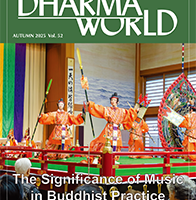 Autumn 2024, Volume 51 (PDF)
Autumn 2024, Volume 51 (PDF)
Rites for the Departed
Cultural and religious perspectives shape how death is perceived and how the dead are honored, leading to a range of practices across the world. Belief in an afterlife is common across many cultures and religions, which highlights the significance of praying for the departed soul’s eternal peace.
Memorial services are held in a variety of settings and are meant to reflect the beliefs and values of the departed and their loved ones. They are often held to heal the grief of the bereaved and, in sociological terms, transition the deceased person from the category of the living to the category of an ancestor. Bereaved families and friends come together to grieve together, remember, and celebrate the life of the deceased.
But attitudes toward the rites for the dead are changing along with the times. In Japan, for example, in answer to a question asking about the meaning of funerals, only about 30 percent answered “sending the deceased to the afterlife,” while about 60 percent replied “bidding farewell to the deceased and comforting bereaved family members.” In other words, memorial services are viewed less as religious rites and more as rituals in human relations.
Economic realities, together with attitudes, are also influencing funeral rites, as more and more families do not have the wealth to have large elaborate funerals or even proper graves. This has led to the popularity of a private family-only funeral (kazoku-so), cremation without a funeral service (choku-so), and so forth.
In the autumn 2024 issue of Dharma World, we will explore the meaning and purpose of death rituals in today’s society.























































































